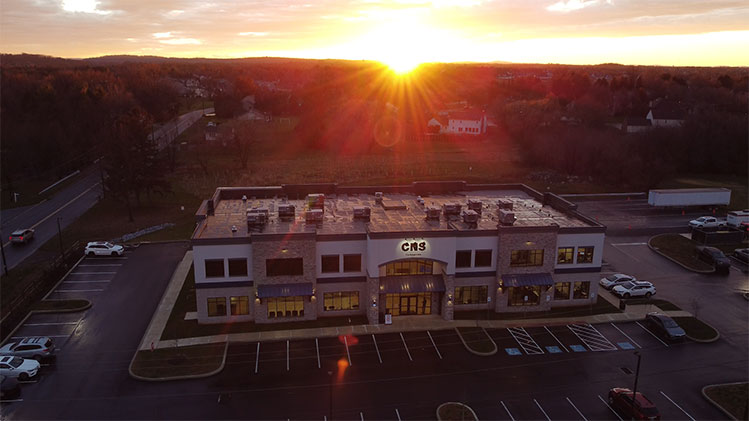Furry Friends Cause Trucking Border Delays At Canadian Border
To prevent reintroduction of rabies carried by dogs into the United States, new CDC regulations require proof of healthy pets at border crossing. Truckers who
We are a team of DOT Compliance and Licensing Professionals helping trucking and transportation companies remain safe, compliant, and profitable.
CNS or Compliance Navigation Specialists is DOT Compliance company that assists trucking and transportation companies remain DOT Compliant. We are part of a network of companies, CNS Companies, specializing in services related to the transportation, manufacturing, construction, service, education and medical industries.

A full-scale DOT Compliance Program managing a long haul carrier’s safety, compliance, licensing and more.
Learn more >>>
A DOT Compliance Program that keeps motor carriers compliant with the 6 Basic DOT Regulations required of all carriers.
Learn more >>>
Our Short-Haul/Construction Program is a full-scale program designed for private carriers that do not haul for-hire.
Learn more >>>
Our most comprehensive DOT Compliance Program, operating as your company’s off-site Safety Director or assisting your current safety personnel.
Learn more >>>
Our Non-CDL Program is a full-scale program managing safety, compliance, licensing and more for moving companies, couriers, landscapers, or any company subject to DOT regulations and does not employ CDL drivers.
Learn more >>>
Our DOT Audit Services cover a number of different types of DOT Audits that new and existing carriers will be subject to.
Our DOT Driver Services help trucking companies and carriers to stay compliant as they grow and hire more drivers.
Our DOT Vehicle Services focus on ensuring your vehicles are compliant with DOT Regulations, which is just as important as your drivers.
Our DOT Services for Special Carriers focus on companies outside of the typical motor carrier, like HAZMAT, Passenger and Bus Carriers.
CNS is part of a group of companies that offer other necessary services for the trucking and transportation industry, such as Commercial Trucking Insurance, CDL Training, Online Training Course, and even Healthcare.
Our DOT Licensing Services will cover you whether you are an existing company or just starting a trucking company. Our DOT Licensing Specialists can help you get up and running and in days with your DOT number, MC Authority, EIN, UCR, IFTA, 2290 HVUT, Fuel Taxes and can even set you up to get your Commercial Driver's License (CDL) with CNS Driver Training Center.
Our DOT Licensing Specialists will help you with every aspect of starting a trucking company. All you need to do is choose a name for your trucking company.
You will need to ensure your DOT Number, MC Authority, Vehicle Registration, etc. is all set up properly when you start your trucking business.
Our Licensing Specialists can help with all aspects of filing and renewing licenses, fuel taxes, etc.
CNS is part of a group of companies that offer other necessary services for the trucking and transportation industry, such as Commercial Trucking Insurance, CDL Training, Online Training Course, and even Healthcare.
To prevent reintroduction of rabies carried by dogs into the United States, new CDC regulations require proof of healthy pets at border crossing. Truckers who
CNS or Compliance Navigation Specialists is DOT Compliance company that assists trucking and transportation companies remain DOT Compliant. We are part of a network of companies, CNS Companies, specializing in services related to the transportation, manufacturing, construction, service, education and medical industries.
CNS Companies is a network of companies specializing in services related to the transportation, manufacturing, construction, service, education and medical industries. Our DOT Compliance division is handled by Compliance Navigation Specialists, CNS Insurance handles Commercial Truck Insurance, CDL training is managed by the CNS Driver Training Center and healthcare is managed by CNS Occupational Medicine.
We are a team of DOT Compliance and Licensing Professionals helping trucking and transportation companies remain safe, compliant, and profitable.
CNS or Compliance Navigation Specialists is DOT Compliance company that assists trucking and transportation companies remain DOT Compliant. We are part of a network of companies, CNS Companies, specializing in services related to the transportation, manufacturing, construction, service, education and medical industries.

A full-scale DOT Compliance Program managing a long haul carrier’s safety, compliance, licensing and more.
Learn more >>>
A DOT Compliance Program that keeps motor carriers compliant with the 6 Basic DOT Regulations required of all carriers.
Learn more >>>
Our Short-Haul/Construction Program is a full-scale program designed for private carriers that do not haul for-hire.
Learn more >>>
Our most comprehensive DOT Compliance Program, operating as your company’s off-site Safety Director or assisting your current safety personnel.
Learn more >>>
Our Non-CDL Program is a full-scale program managing safety, compliance, licensing and more for moving companies, couriers, landscapers, or any company subject to DOT regulations and does not employ CDL drivers.
Learn more >>>
Our DOT Audit Services cover a number of different types of DOT Audits that new and existing carriers will be subject to.
Our DOT Driver Services help trucking companies and carriers to stay compliant as they grow and hire more drivers.
Our DOT Vehicle Services focus on ensuring your vehicles are compliant with DOT Regulations, which is just as important as your drivers.
Our DOT Services for Special Carriers focus on companies outside of the typical motor carrier, like HAZMAT, Passenger and Bus Carriers.
CNS is part of a group of companies that offer other necessary services for the trucking and transportation industry, such as Commercial Trucking Insurance, CDL Training, Online Training Course, and even Healthcare.
Our DOT Licensing Services will cover you whether you are an existing company or just starting a trucking company. Our DOT Licensing Specialists can help you get up and running and in days with your DOT number, MC Authority, EIN, UCR, IFTA, 2290 HVUT, Fuel Taxes and can even set you up to get your Commercial Driver's License (CDL) with CNS Driver Training Center.
Our DOT Licensing Specialists will help you with every aspect of starting a trucking company. All you need to do is choose a name for your trucking company.
You will need to ensure your DOT Number, MC Authority, Vehicle Registration, etc. is all set up properly when you start your trucking business.
Our Licensing Specialists can help with all aspects of filing and renewing licenses, fuel taxes, etc.
CNS is part of a group of companies that offer other necessary services for the trucking and transportation industry, such as Commercial Trucking Insurance, CDL Training, Online Training Course, and even Healthcare.
To prevent reintroduction of rabies carried by dogs into the United States, new CDC regulations require proof of healthy pets at border crossing. Truckers who
CNS or Compliance Navigation Specialists is DOT Compliance company that assists trucking and transportation companies remain DOT Compliant. We are part of a network of companies, CNS Companies, specializing in services related to the transportation, manufacturing, construction, service, education and medical industries.
CNS Companies is a network of companies specializing in services related to the transportation, manufacturing, construction, service, education and medical industries. Our DOT Compliance division is handled by Compliance Navigation Specialists, CNS Insurance handles Commercial Truck Insurance, CDL training is managed by the CNS Driver Training Center and healthcare is managed by CNS Occupational Medicine.

What is your company’s Return to Work Plan?
As stay at home orders are being lifted across the country and employees start trickling back into the office or plants, it would be wrong to assume things will return to normal.
It is imperative that business owners take responsibility for protecting their employees and this can be accomplished by developing a Return to Work Plan for their organization.
In hotspots like New York, many are convinced they have already been exposed to and contracted COVID-19. However, the worse thing a person could do is assume they are immune because they believe that fever back in January was COVID-19.
This type of mentality makes a Return to Work Plan even more important.
Basically, it means that businesses need to create a process and an environment that makes it safe for their employees to return to work.
Each Return to Work Plan will of course be unique to the company, but there are many similar concepts that can be implemented, including:
There is a much longer list of rules and procedures that business owners can follow, but our focus is on the two that will assist in determining if employees are safe to be at work, Antibody Testing and Pre-shift Temperature Screenings.
The COVID-19 Antibody Test provides individuals insight into whether they have been exposed to coronavirus and developed antibodies. This could be invaluable information for your company and assist in many decisions related to those employees who have developed immunity.
According to the US Food and Drug Administration, COVID-19 antibody testing may indicate whether “the person has been exposed to the virus and developed antibodies against it, which may mean that person has at least some immunity to the coronavirus.”
However, it is important to note that the length of protection and whether the antibodies protect from re-infection is unknown at this point.
On May 7, a New York Times article detailed a new study that “adds evidence of immunity among those who have already been exposed to the disease, regardless of age, sex or severity of illness – making antibodies to the virus.” Experts were shocked by the percentage of people who have antibodies that were never diagnosed with coronavirus.
While the science on COVID-19 is evolving, testing for antibodies may help identify individuals who have likely been exposed. This information is helpful to make informed decisions about their risk of infection and spreading the virus in the workplace.
This is useful for employers as staff who are immune could replace vulnerable individuals, especially in high-transmission settings in the transportation industry, building a “shield immunity” in the population.
As of this writing, the Center for Health Security has provided a list of tests approved for research or individual use in the US that accurately detect antibodies in people who have them between 82 and 100 percent of the time. Their ability to correctly identify antibodies only in those who actually have them ranges from 91 to 100 percent.
It may take up to 14 days after the onset of symptoms for antibodies to be developed within the body and 91% of people develop such antibodies within the first 8-13 days. Some of those infected with COVID-19 will never exhibit symptoms, but will have a detectable antibody response.
Antibody testing is not intended for use in individuals with an active COVID-19 infection, including individuals with symptoms. Patients who believe they may have COVID-19 are strongly encouraged to contact their healthcare provider.
All interested persons who have neither felt feverish in the last 3 days nor experienced any other COVID-19 symptoms within the past 10 days are appropriate candidates. Symptoms include:
To protect collection site staff, please remember to wear either a face mask or some other form of face covering, when arriving at the laboratory collection site.
Pre-Shift Temperature Screenings simply means that you will be screening each crew member and staff when they are reporting for duty, thereby reducing the risk to other employees.
If your employees have direct contact with someone who is ill or otherwise vulnerable populations, you want to know right away to prevent any spreading to other staff members.

Article written by Tim Miller, CNS How stressful is your job? Do you think about it while off the clock? Does it make you anxious

BREAKING: Collapsed I-95 in Philadelphia will open “this weekend”, governor says! North Philadelphia stretch of I-95 is expected to reopen within the next two weeks

As we slowly come out of the COVID-19 pandemic, the construction and landscaping industries are poised to start the spring season with many new safety

COVID-19 vaccines are currently being given to Phase 1A, frontline health care workers and residents and staff at long-term care facilities. On December 20, 2020,
Our DOT Compliance Programs ensure it is your top priority and keeps your business running.
Receive the latest transportation and trucking industry information about FMCSA and DOT Audits, Regulations, etc.

Article written by Tim Miller, CNS How stressful is your job? Do you think about it while off the clock? Does it make you anxious

BREAKING: Collapsed I-95 in Philadelphia will open “this weekend”, governor says! North Philadelphia stretch of I-95 is expected to reopen within the next two weeks

As we slowly come out of the COVID-19 pandemic, the construction and landscaping industries are poised to start the spring season with many new safety
Join our monthly newsletter and stay up-to-date on trucking industry news and receive important compliance and licensing tips.
Join our monthly newsletter and stay up-to-date on trucking industry news and receive important compliance and licensing tips.